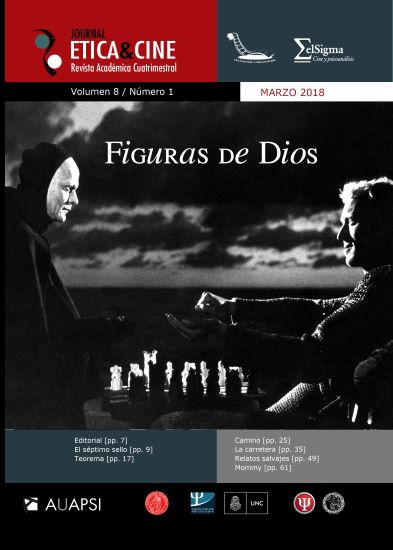God's problem. The Bacchantes and the Bible in Theorem
DOI:
https://doi.org/10.31056/2250.5415.v8.n1.19840Keywords:
Pasolini, Teorema, Transposition, Bacchae, Bible, DionysusAbstract
In this paper we attempt to describe the hypertext mechanisms applied by Pasolini in his novel Teorema and the eponymous film (both 1968), through the incorporation of the myth of Dionysus in The Bacchae of Euripides and some passages of the Bible. From this place In considering the foregoing, the representation will be analyzed of the struggle of social classes in Italy in the late sixties as one of the scenarios for two contending powers: one that is primitive, originative, dignified and close to nature, represented by the working class and peasantry -especially by the character of Emilia-; and the capitalist and bourgeois power, represented by the family as a whole. The antithesis proposed by Pasolini to this fight is the destruction of this family from the presence of a nameless guest, whose origin and destination are unknown; and who, by his configuration, refers to the Greek god Dionysius.Downloads
References
Agamben, G. (2006). El tiempo que resta. Un comentario a la Carta de los romanos. Madrid: Trotta
Bettettini, G., (1996). Cap. 3: Las transformaciones del sujeto en la traducción, en La conversación audiovisual. Madrid: Ed. Cátedra, 2° ed.
Detienne, M. (1986). Dioniso a cielo abierto, Barcelona: Ed. Gedisa.
Eurípides. (1951). Las bacantes en Obras dramáticas. Buenos Aires: Ed. El Ateneo.
Festugière, A. (1986). La esencia de la tragedia griega, París: Les belles lettres.
Grüner, E. (2009). “Los soles de Pasolini” Revista La Fuga No 10. ISSN: 0718-5316. Recuperado de: http://www.lafuga.cl/los-solesde-p. Última consulta: 01/09/16
Mariniello, S. (1999). Pier Paolo Pasolini, Madrid: Ed. Cátedra.
Nápoli, J.T. (2004) “Mito y rito dionisíaco en Bacantes de Eurípides: sobre el origen ritual del teatro”. Ponencia presentada en las Jornadas Diálogos entre Literatura, Estética y Teología, Facultad de Filosofía y Letras, Universidad Católica Argentina. Buenos Aires. Recuperado de: http://bibliotecadigital.uca.edu.ar.
Nietzsche, F. (2003). El origen de la tragedia. Buenos Aires: Ed. Libertador (Andrómeda ed.)
Pasolini, P.P. (1983) “Tetis” en AA.VV, Erotismo y destrucción, Madrid: Ed. Fundamentos.
Pasolini, P.P.; Rohmer, E. (1970a). Cine de poesía contra cine de prosa. Barcelona: Ed. Anagrama. Pp. 5-41.
Pasolini, P.P. (1970b). Teorema, Buenos Aires: Ed. Sudamericana.
Pasolini, P.P. (1965). “Autopresentación” en Revista Nuestro Cine, No 46, Madrid. pp 13 -19. Traducción y montaje de textos: Ricardo Diaz-Delgado. Recuperado de: http://www.adversus.org/indice/nro4. Última consulta: 01/09/16
Santa Biblia (2009). Estados Unidos: La Iglesia de Jesucristo de los Santos de los Últimos Días. Recuperado de: http://media.ldscdn.org/pdf/lds-scr. Última consulta: 01/09/16
Downloads
Published
How to Cite
Issue
Section
License
Los autores que publiquen en Ética y Cine Journal aceptan las siguientes condiciones:
Los autores/as conservan los derechos de autor © y permiten la publicación a Ética y Cine Journal, bajo licencia CC BY-SA / Reconocimiento - Reconocimiento-CompartirIgual 4.0 Internacional. La adopción de esta licencia permite copiar, redistribuir, comunicar públicamente la obra, reconociendo los créditos de la misma, y construir sobre el material publicado, debiendo otorgar el crédito apropiado a través de un enlace a la licencia e indicando si se realizaron cambios.

Este obra está bajo una licencia de Creative Commons Reconocimiento-CompartirIgual 4.0 Internacional.




